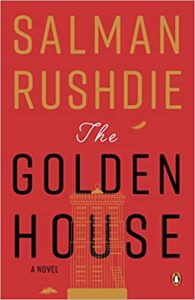The Golden House
Author: Salman Rushdie
Publisher: Penguin Random House India
Rating: 3/5

When India suffered at the hands of the terrorists in 2008, nobody would have thought in their wildest imagination that the attack of 26/11 would become one of the most common settings of most novels. The Golden House, too, is set at the same time. The story explores the pathos of having a diabolical past and an earnest attempt of the characters to escape the consequences of their horrendous actions. What we all learn in the process is that the past beats inside all characters like their second heart.
“and I began to wonder if we were moral beings at all or simply savages who defined their private bigotries as necessary ethics, as the only ways to be.”
― Salman Rushdie, The Golden House
The Golden House is the story that revolves around the ambiguous people who live in ‘The Golden House’ situated in downtown Manhattan. An affluent man from Bombay moves to this anonymous mansion with his three sons (all of them having fake names). He comes across as despotic and overweening when he is first introduced. Contrary to his outgoing and social nature, his sons are very different from what one would expect. Caught in the whirlpool of stereotypes and the judgements of the society, each of the characters has their own battle to fight. While Nero Golden, the father, is unable to overcome his sexual desires, his eldest son, Petya (Petronius), is a victim of autism and is agoraphobic. The second son, Apu (Lucius Apuleius) is the only character who seems to understand other characters and is shown to be real enough because he is afraid of his father’s shadow and eventually meets a fateful end. He is a painter whose perspective is often not met with agreement. The third and the youngest son, D (Dionysius), is one of the most complicated characters in the story. Battling with severe identity issues, he is mostly at the receiving end whenever anything goes wrong.
The story has been narrated in the first person by Rene, Goldens’ neighbour, who aspires to become a filmmaker. He believes that if he captures the pretentious life of the Goldens in his camera, his career will take off smoothly. With each character thinking about fulfilling his/her own personal motives, the story progresses at a snail’s pace. The author exposes us to the unpredictable and unreliable human mind that can defy any rules or any norms that come in the way of personal well-being. He also uses enough (read too much) hyperbole to portray a society where the backstories of the characters are stranger than fiction. Layer by layer and after the introduction of a malicious character named Vasilisa, a Russian, who devours the joyful moments from Nero Golden’s life like how a leech sucks the blood from the exposed skin, the author unties the knots, thereby giving us a deeper insight into the life of these men. This woman changes the course of every character’s life. Post her arrival, betrayal, lies, bigotry, plotting, misery, heartbreaks and insanity become common in the Golden House.
While Rene tries to give the readers a first-hand account of all that happens under his watch, the readers often succumb to the unrestrained references to the pop culture, History, Literature, Myth and Current Affairs! However, the themes that Salman Rushdie touches are of great significance. He brings forth the trauma of an autistic man who falls in love but loses it too soon because of his agoraphobia. He highlights the transgender debate through the life of Nero’s youngest son, D. He also touches upon the concept of seven sins, namely, pride, wrath, greed, gluttony, envy, lust and sloth. Each character has a battle between vice and virtue going on and it becomes quite interesting to read about the extent a man can go to salvage his conscience when he is guilty of a crime!
Laced with superfluous allusions and extensive vocabulary, The Golden House takes forever to reach the climax. The narrative is exhaustive in terms of descriptions and in the process, the characters have not been explored in depth. The Golden House cannot be classified as light reading, for it has too much information to take in and at times, the incomprehensible references break the flow. Honestly, I took too many pauses to finish this book and that’s why whenever I restarted, I had to go back a chapter and then begin. The overall impact is short-lived because this book is less about the plot and more about the language. The plot, trust me, is straightforward. There are no major twists and turns. What stayed with me though, was the character of Vasilisa. Crafty and witty, she was the only one in the whole story who could make an arrogant Nero Golden bend before her. It was ironical how the reason behind the beginning of this story was a woman and the reason behind the end of this story was also a woman!
Overall, The Golden House is not everyone’s cup of tea. What one is sure to feel about this book is the feeling of accomplishment of having finished this long ride! If you are planning to pick this one up, buckle up as literary devices are going to make your mind active and kicking!
Buying Link: Amazon